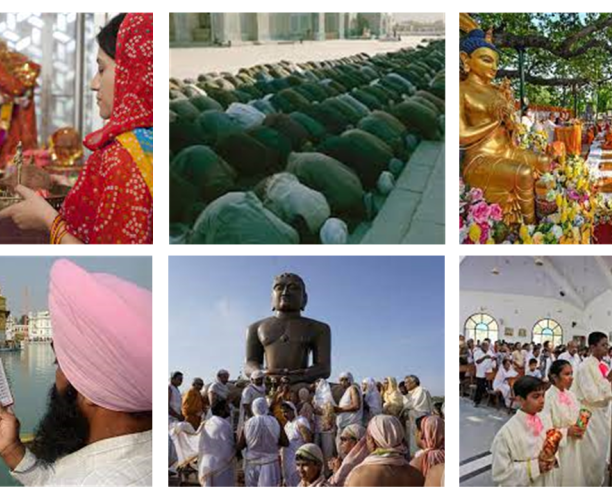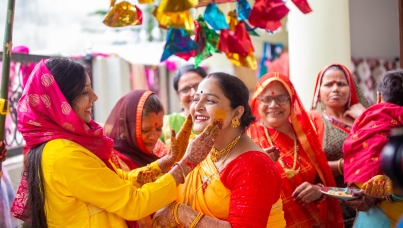

8 in 10 Urban Indians claim being comfortable around people of different faiths as them: Ipsos Global Religion 2023 Survey
A new 26-country global advisor survey by Ipsos titled Global Religion 2023 – Religious Beliefs Around the World shows at least 8 in 10 urban Indians (80%) claim to be comfortable around people of different faith. With 3 in 4 global citizens echoing similar views (76%).
Religion plays a key role in the everyday life of urban Indians with at least 86% of urban Indians polled believing religious practices are an important factor in the moral life of citizens. Advocating the merits of being religious, at least 8 in 10 urban Indians (81%) said people with religious faith are happier; 79% said people with religious faith are better citizens; and 86% Indians claimed to be defined by their religion.
Religious Beliefs
The findings are particularly fascinating for India.
At least 8 in 10 urban Indians (81%) said they believe in the existence of God or a higher power. And 7 in 10 urban Indians of different faiths (70%) said they believe in God as described in their holy scriptures.
Among global citizens 61% said they believe in the existence of God or higher power.
Delving deeper into other beliefs, views were polarized towards whether Heaven exists, with 54% urban Indians believing it does – 79% Peruvians and Brazilians claimed to be believing in the existence of heaven. 43% urban Indians believe in the existence of Supernatural Spirits (angels, demons, fairies and ghosts etc.); 47% urban Indians believe Hell exists and 4 in 10 urban Indians (41%) believe the Devil exists.
Being religious, believing in the existence of God or higher power is seen as a solution for life’s rigors with 8 in 10 urban Indians (83%) believing, it helps them in overcoming crises. Gives meaning to their lives (83%) and infuses their life with happiness (83%).
Interestingly, atheists are somewhat frowned upon, with at least 73% urban Indians claiming to lose respect for those without a religious faith.
Religious practice by country
3 in 4 urban Indians (74%) claimed to have prayed outside a place of worship (at home) at least once or more than once a month. And 44% of global citizens claimed to be praying outside (at home).
7 in 10 urban Indians (71%) claimed to have visited a place of worship at least once or more than once a month, with only 28% global citizens claiming to have visited a religious shrine in the last one month.
Summarizing on the findings of the survey, Amit Adarkar, CEO, Ipsos India said, “India has exemplified how people of different faiths can co-exist amicably and being defined by the good teachings in their holy scriptures. Believing in the existence of God or a higher power makes people navigate and trudge through their lives with ease and making them happier humans. India definitely is a land of different faiths and can be defined as a religious country of pluralism.”
About the Study
These are the results of a 26-country survey conducted by Ipsos on its Global Advisor online survey platform and, in India, on its IndiaBus platform, between January 20 and February 3, 2023. For this survey, Ipsos interviewed a total of 19,731 adults aged 18 and older in India, 18-74 in Canada, South Africa, Turkey, and the United States, 20-74 in Thailand, 21-74 in Singapore, and 16-74 in all other countries.
The sample consists of approximately 1,000 individuals each in Australia, Brazil, Canada, France, Germany, Great Britain, Italy, Japan, Spain, and the U.S., and 500+ individuals in each of Argentina, Belgium, Chile, Colombia, Hungary, Mexico, the Netherlands, Peru, Poland, Singapore, South Africa, South Korea, Sweden, Thailand, and Turkey. The sample in India consists of approximately 2,200 individuals of whom 1,800 were interviewed face-to-face and 400 were interviewed online.
Samples in Argentina, Australia, Belgium, Canada, France, Germany, Great Britain, Hungary, Italy, Japan, the Netherlands, Poland, South Korea, Spain, Sweden, and the U.S. can be considered to be representative of their general adult populations under the age of 75. Samples in Brazil, Chile, Colombia, Mexico, Peru, Singapore, South Africa, Thailand, and Turkey are more urban, more educated, and/or more affluent than the general population. The survey results for these countries should be viewed as reflecting the views of the more “connected” segment of their population. India’s sample represents a large subset of its urban population — social economic classes A, B and C in metros and tier 1-3 town classes across all four zones.
The data is weighted so that the composition of each country’s sample best reflects the demographic profile of the adult population according to the most recent
census data.
The “26-country average” reflects the average result for all the countries where the survey was conducted. It has not been adjusted to the population size of each country or market and is not intended to suggest a total result.
Where results do not sum to 100 or the ‘difference’ appears to be +/-1 percentage point more/less than the actual result, this may be due to rounding, multiple responses, or the exclusion of “don't know/not sure” or not stated responses.
The precision of Ipsos online polls is calculated using a credibility interval with a poll of 1,000 accurate to +/- 3.5 percentage points and of 500 accurate
to +/- 5.0 percentage points. For more information on Ipsos’s use of credibility intervals, please visit the Ipsos website.
The publication of these findings abides by local rules and regulations.
In India the majority polled were Hindus and in Thailand, Buddhists.



